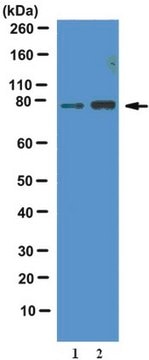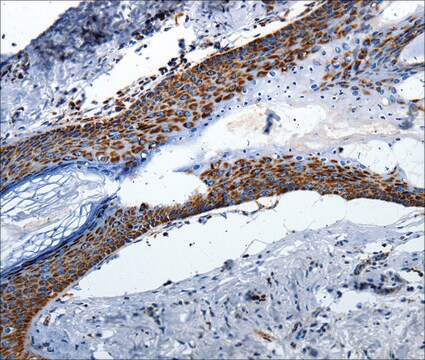MABN70
Anti-Slo1 Antibody, clone L6/60
clone L6/60, from mouse
Synonym(s):
potassium large conductance calcium-activated channel, subfamily M, alpha member 1, Slo homolog, stretch-activated Kca channel, Maxi K channel, Drosophila slowpoke-like, Calcium-activated potassium channel, subfamily M subunit alpha-1, Slowpoke homolog,
About This Item
Recommended Products
biological source
mouse
Quality Level
antibody form
purified immunoglobulin
antibody product type
primary antibodies
clone
L6/60, monoclonal
species reactivity
rat
species reactivity (predicted by homology)
mouse (immunogen homology)
technique(s)
immunocytochemistry: suitable
immunohistochemistry: suitable
western blot: suitable
isotype
IgG2aκ
NCBI accession no.
UniProt accession no.
shipped in
wet ice
target post-translational modification
unmodified
Gene Information
human ... KCNMA1(3778)
General description
Specificity
Immunogen
Application
Immunocytochemistry Analysis: A previous lot was used by an independent laboratory in IC. (Misonou, H., et al. (2006). J Comp Neurol. 496(3):289–302.)
Neuroscience
Signaling Neuroscience
Quality
Western Blot Analysis: 1 µg/mL of this antibody detected Slo1 on 10 µg of rat brain membrane tissue lysate.
Target description
Physical form
Storage and Stability
Analysis Note
Rat brain membrane tissue lysate
Other Notes
Disclaimer
Not finding the right product?
Try our Product Selector Tool.
Storage Class Code
12 - Non Combustible Liquids
WGK
WGK 1
Flash Point(F)
Not applicable
Flash Point(C)
Not applicable
Certificates of Analysis (COA)
Search for Certificates of Analysis (COA) by entering the products Lot/Batch Number. Lot and Batch Numbers can be found on a product’s label following the words ‘Lot’ or ‘Batch’.
Already Own This Product?
Find documentation for the products that you have recently purchased in the Document Library.
Our team of scientists has experience in all areas of research including Life Science, Material Science, Chemical Synthesis, Chromatography, Analytical and many others.
Contact Technical Service








